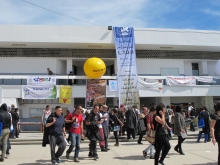Energy and development policies at the WSF

PSI organised one meeting on Energy within the WSF to focus on three key issues:
- the €600 billion Desertec project, to generate solar electricity from the Maghreb for export to Europe
- hydraulic fracturing of shale gas (aka fracking)
- energy and development policies.
The content of discussions was quite technical, given the presence of trade unionists from the sector and university professors, as well as a couple of sharp environmental NGOs. No one in the group is opposed to the Desertec project, but it needs to be approached differently, there needs to be much more social inclusion, more debate before legislation is passed. All in the group oppose fracking, given the massive amounts of water needed, the dangers of pollution and the seismic instability caused by the exploration. It was agreed to coordinate a Tunisian group to work on Desertec and another one on fracking).
Unions from Nigeria, Ghana and Rwanda commented on the very difficult environments for increasing access to electricity, including corruption, externally-driven privatisation and the lack of finance. The Tunisian public utility of electricity and gas STEG has a long track record of capacity building and mutual assistance with other African utilities. It is currently working on a project in Rwanda, and our trade union colleague from Rwanda indicated that it was well received. Our colleague from UGTT will acquire more information from management about these practices, which could fit into the public-public partnership model.
A second meeting attended by a number of PSI delegates was organised by a German NGO called GermanWatch. This meeting appeared to be aimed at getting together groups critical of the Desertec project, but it turned out to be a promotion of Desertec, with speakers from Dii (Desertec industrial initiative) and the Desertec Foundation. In the audience, was a staff member of the German development and aid branch of the government GIZ. Mansour Cherni from the electricity and gas union of UGTT commented on the way that Dii and the Desertec Foundation operate in Tunisia, with no response to the trade union requests for engagement. The rest of the participants in the meeting were also highly critical of the arrogant way in which the projects were being implemented. After the meeting, the representatives approached Mansour to seek a meeting.

